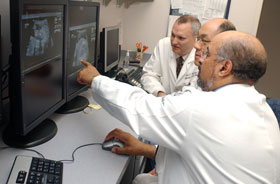  |
| HOME | THIS ISSUE | CALENDAR | GRANTS | BACK ISSUES | < BACK | NEXT > |
Patient care, research highlight career in maternal-fetal medicineby Jane Shaskan- October 2, 2006 |
||||
|
Dr. Winston Campbell was turned on to his career by a documentary about childbirth. "It's how we all started, birth. I wanted to be part of that," he says. "I was awestruck." Campbell, who originally expected to become an engineer, decided on a career in medicine so he would have the opportunity to work with a wide variety of people. The documentary he saw cemented his goal. After more than 25 years in the field, including the past 10 as Physicians Health Services Endowed Chair in Maternal-Metal Medicine at the UConn Health Center, Campbell says "birth never ceases to be awe-inspiring" for him. Campbell, a graduate of the UConn School of Medicine, was introduced to maternal-fetal medicine by clinical perinatologist Dr. John Gibbons, who started the first maternal-fetal medicine clinical service in the Hartford area. After completing his residency in obstetrics and gynecology in 1981, Campbell completed sub-specialty training with Dr. David Nochinsom, who started an accredited maternal-fetal medicine fellowship program at the Health Center. Over the next 12 years, he served in a variety of leadership positions at the Health Center, St. Francis Hospital and Medical Center, and New Britain General Hospital. Currently, in addition to his clinical responsibilities at the Health Center, Campbell is involved in HIV/AIDS transmission prevention research as part of a national clinical trial. He says he finds special satisfaction in taking care of patients with HIV infections. "Patients are very grateful for care, especially mothers who want to fulfill their dream and have a child," he says. "They appreciate the help they receive to have the best outcome for their newborn, and the support they need when they learn they have HIV. These women have to deal with facing their own mortality and deal with the realization that they are going to die prematurely, but they also find out that they will be able to have what healthy people have - children, family.
Campbell says fear and ignorance still surround HIV and AIDS, despite advances in knowledge and the education and treatment that are now available. "There are ways to improve and support infants with HIV and decrease mortality rates," he says. "We have made a very strong impact on reaching that goal in this country," Campbell notes. "Transmission has been reduced to about 2 percent. Without intervention, it would be between 25 percent and 30 percent." Although clinical work is Campbell's focus, he appreciates the balance research and education offer. "My role as a teacher in the medical school is not lectures and presentations," he says. "I teach by working with students, teaching them by example." As for his patients, he tries to instill in them the importance of personal involvement in health care. "Patients will come into my office and say they didn't call with a problem because they were coming in anyway for an appointment," Campbell says. "I tell them, 'Don't wait if you think something's wrong. Someone's always on call.' A couple of days can make a critical difference in the patient's outcome." |
| ADVANCE HOME UCONN HOME |

